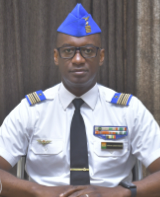Niger
Spotlight 24
1. Interview

Colonel Major Hamadou Ousseini Ibrahim
Director General, CAA Niger

“Niger is a Member State of the SAATM Pilot Project. The launch of the SAATM PIP by certain so-called “pilot” states provides an opportunity to improve interconnectivity and offer African countries a whole range of economic benefits.”
1) What were your achievements at the Civil Aviation Authority as well as in the area of aviation in your country in 2023 ?
- The National Civil Aviation Agency of Niger (ANAC-Niger) is committed to bringing the organisation of its national regulations into compliance with international standards in the area of civil aviation. To this end, in the area of security, a number of reforms have been implemented, including the establishment of a Coordination Unit for the Implementation of Security and Facilitation Measures at the Diori Hamani International Airport (AIDH); the setting up of the National Civil Aviation Security Committee; the setting up of the Airports Committee on Civil Aviation; and the amendment and adoption of the National Civil Aviation Security Programme.
In the area of safety, the Accidents Investigation Bureau has been set up and new civil aviation inspectors have been assigned. In addition, the Technical Regulations for Civil Aviation (RTAC) have been updated in all areas of civil aviation, in accordance with the amendments to the annexes to the Chicago Convention.
As regards infrastructure, the following should be noted:
- the construction of four (04) landing strips as part of the of the Niger-Benin pipeline operation;
- the acquisition of a fire-fighting vehicle for Maradi airport;
- the construction of a total of 2,640 ml of fencing at Zinder, Agadez and Tahoua airports;
- the replacement of outdated airport equipment;
- the construction of a meteorological observatory in Magaria;
- the closure of the Bilma, Magaria and N’guigmi weather stations;
- the strengthening of safety management systems (SMS) through the appointment of new inspectors; and
the hosting of a WAEMU assistance mission through the URSAC (Regional Unit for Civil Aviation Management) unit of WAEMU.
2) What are your current challenges and how can AFCAC support you ?
Niger’s civil aviation sector is confronted with a number of challenges, such as
– capacity building for aviation personnel;
– implementation of its NSP
– development of airport infrastructure, particularly at airports in the interior of the country;
– improvement of services.
AFCAC can support Niger in the areas of capacity building and the implementation of the NSP.
3) What actions are you undertaking to ensure the effectiveness of the Single African Air (SAATM)?
ANAC-Niger plans to further align air services agreements with the Yamoussoukro Decision and implement its annexes. It also plans, on the one hand, to negotiate and sign air service agreements with the other African States that have joined SAATM, and, on the other hand, to promote SAATM through the organisation of forums.
ANAC-Niger will also continue to work towards liberalising Niger’s skies for African airlines under the air services agreements signed with their States, in particular by granting fifth freedoms.
4) What are your observations regarding the SAATM PIP ?
Niger is a Member State of the SAATM Pilot Project. The launch of the SAATM PIP by certain so-called “pilot” states provides an opportunity to improve interconnectivity and offer African countries a whole range of economic benefits.
To achieve full and effective liberalisation of the African airspace, in accordance with the commitment made by the Ministers of Civil Aviation at the 23rd anniversary of the Yamoussoukro Decision, it is important that the conclusions drawn from the discussions between the focal points, and subsequently between the national committees, be implemented at operational and decision-making levels.

2. Fact Sheet
3. 5th freedom routes
A good number of airlines on the continent are already exercising or benefiting from these freedoms. These include Asky on the Niamey-Ouagadougou-Niamey route, Niamey-Cotonou-Niamey, Niamey-Bamako-Niamey, Niamey-Dakar-Niamey, Royal Air Maroc on the Niamey-N’Djamena-Niamey route, Tunisair on the Niamey-Abidjan-Niamey route and Air Côte d’Ivoire on the Ouagadougou-Niamey-Ouagadougou route.
In addition, Turkish Airlines, a Turkish-owned airline, also operates fifth freedom rights on the Niamey-Bamako-Niamey and Niamey-N’Djamena-Niamey routes.



